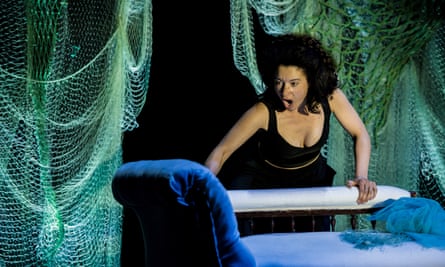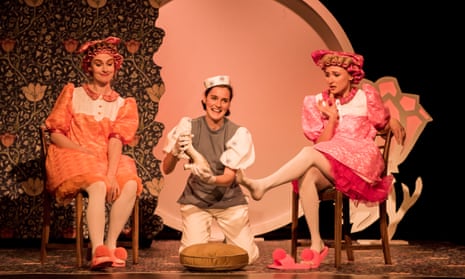Buxton had just celebrated 40 years of its international summer festival when the pandemic forced its cancellation in 2020. Returning this year, 2021’s festival boasts its most imaginative operatic lineup in years.
That there’s new artistic ambition in the air is clear from BIF’s co-commissioning of Errollyn Wallen’s new opera Dido’s Ghost in tandem with the Barbican, Dunedin Consort and Mahogany Opera. The piece’s Buxton outing is its second, after its Barbican premiere in June. It’s a work haunted by Purcell’s Dido and Aeneas: we hear it more or less in its entirety as an opera-within-an-opera, stylishly speedy as played by the Dunedin Consort under John Butt. Yet Purcell’s music also lurks within Wallen’s own score – a beguiling tapestry of fragmentary quotations and knowing gestures to an earlier music language, overlaid with a contemporary sonic palette (the eerie bloom of an electric bass; harmonies that crunch and slide).

The socially distanced black-box staging felt clunky at times, but much of the singing was subtle and poignant. Stepping it at the last minute, Isabelle Peters was a rich-toned Dido/Anna. Nardus Williams offered bright filigree lines as Belinda, her stage presence poised, while Jessica Gillingwater was a hard-as-nails Lavinia, Aeneas’s wife. As Aeneas, Matthew Brook was hugely sympathetic, journeying from stentorian heroism to unearthed heartbreak, singing partly in falsetto what Purcell wrote as Dido’s famous lament – an unforgettably moving effect.
Would BIF have staged a long-forgotten salon operetta by the 19th-century singer and composer Pauline Viardot, its cast dominated by students and recent graduates of Manchester’s Royal Northern College of Music, in a world without the pandemic? We’ll never know, but this performance of Cendrillon (Cinderella) was an absolute joy. Directed with care and resourcefulness by Laura Attridge, the familiar story unfolds in an ultra-simple, beautifully lit set: wooden lattice screens; a William-Morris-papered wall; minimal furniture.
Nikki Martin was a silver-voiced Cinders, her character given a much-needed confidence boost by Viardot (“If I weren’t here, who would do your hair?”, she challenges her sisters). As those sisters, Olivia Carrell and Flora Macdonald supplied all the giggling cringe you could possibly need and knocked off a mean interpolated rendition of Offenbach’s famous barcarolle. Camilla Seale’s adorable Prince Charming, Ross Cumming’s impossibly camp Baron, Pasquale Orchard’s Lakmé-ish fairy godmother, Andrew Henley’s chamberlain – these were all exquisite performances, their commitment matched by Iwan Davies’s sensitive accompaniment at the piano. The best 75 minutes I’ve spent in ages.

Comments (…)
Sign in or create your Guardian account to join the discussion